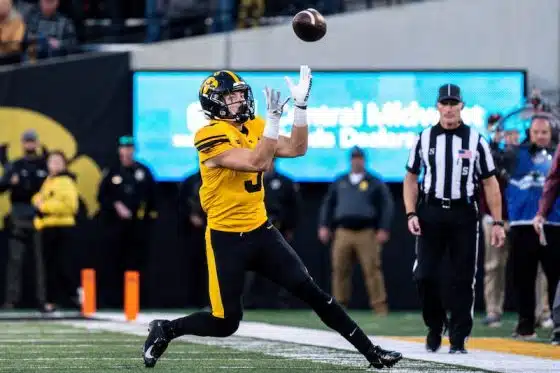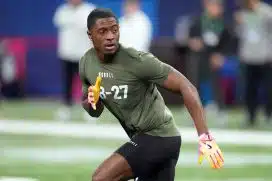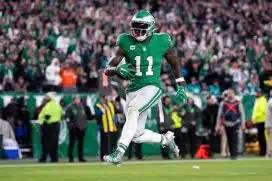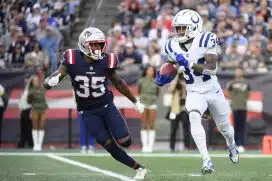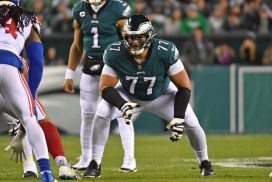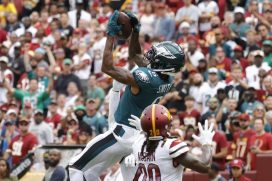By Kevin Durso, Sports Talk Philly editor
Before taking the field on Jan. 13, the last time the Eagles had played in a playoff game was on Jan. 4, 2014, the first season under new head coach Chip Kelly.
That team was somewhat like this team. They were upstart. Their success was unexpected. But here they were in the playoffs, at home, fresh off a division title.
By the record, what happened over the next year wasn’t terrible. The Eagles missed the playoffs despite a 10-6 record in Year 2 of Chip Kelly. But in Year 3, they were eliminated from the playoffs in Week 16 and fired Kelly after the 6-9 record. It was three days shy of the one-year mark when Kelly was given full control, handling player personnel decisions as well as coaching duties.
That was on Dec. 29, 2015 and it looked like a mountainous climb for the Eagles to return to relevance.
They made two trades to move up in the draft, going from the 13th overall pick to the second to draft Carson Wentz. They had their quarterback. They hired Doug Pederson to follow Kelly as head coach, taking another former coach of Andy Reid and trying to replicate the best years under him from the early 2000s. They put Howie Roseman back in charge of player personnel.
And in two short years, look where it has them. Who would have thought that in December 2015, when the Eagles hit rock bottom, fired the innovative coach hired to get them to the promised land, that it would be the same quarterback and a coach with the complete opposite demeanor and personality to get them on the cusp of a title.
The Chip Kelly Years
It was time for a change. Andy Reid’s time in Philadelphia came to an end after a 4-12 season in 2012. And when the Eagles named their first head coach in 14 years, they made a splash.
Enter Chip Kelly, the innovative college coach who swept the nation with his high-powered offenses at Oregon. He was supposed to be the savior for the Eagles, to take the league by storm and bring the Eagles back to the playoffs.
Things got off to a good start. The Eagles caught fire with Nick Foles at quarterback and an offense that piled up yardage and points. The Eagles rolled into the playoffs dramatically with a 10-6 record and a clinching win over the Dallas Cowboys in Week 17.
But if there was one flaw to Kelly’s style, it was how quickly they tried to score and how little time of possession mattered in his system. So while Foles played well and the Eagles held a lead late in the fourth quarter against the New Orleans Saints, but left plenty of time for Drew Brees to march down the field to set up the game-winning field goal, knocking the Eagles from the playoffs.
The next season, Kelly and the Eagles started 5-1 as they entered the bye week, primed for another playoff appearance. Out of the bye, the Eagles went 4-2 over the next six weeks to be at 9-3 with four games remaining. They dropped three straight games, including a home game in Week 16 against Washington that eliminated them from the playoffs. Despite the 10-6 record, matching the record from Kelly’s first season, the Eagles were out of the playoffs.
While it was still a fairly successful season on the field, one that had the Eagles in position to be in the playoffs right to the end, things were rapidly changing for the franchise. The promise that was there at the start of Chip Kelly’s tenure was becoming something else…
Power Struggle
The next offseason was one that was filled with off-the-field drama. In Kelly’s quest for power within the organization, the team essentially kicked general manager Howie Roseman to the curb and gave Kelly control of player decisions.
In the months that followed, the team traded LeSean McCoy to Buffalo for Kiko Alonso and traded Foles to St. Louis for Sam Bradford. They also added free agent running back DeMarco Murray.
They released longtime players like Todd Herremans, Trent Cole and Evan Mathis. They also released cornerback Cary Williams and replaced him with Byron Maxwell on a sizable deal.
It was ultimately a move that proved costly to the Eagles as a franchise and created a locker room tension. Players were unhappy and when the team took the field for the 2015 season, things were very different.
The Eagles started the season 0-2, went into the bye with a 3-4 record and were eventually at a 4-7 record. Back-to-back wins improved them to 6-7 and as they entered Week 16, there was actually still a chance the Eagles could steal the division if they won the final two games of the season, which included beating division-leading Washington.
The Eagles played from behind for much of that game, falling 38-24 to drop to 6-9 on the season.
Three days after the Eagles were eliminated from playoff contention for the second straight season, Kelly was fired, putting an end to one of the more painful and treacherous seasons in Eagles history.
Starting Over
With Chip Kelly out of the picture, the Eagles went back to square one. That meant putting Howie Roseman back in charge as vice president of football operations and adding Joe Douglas as vice president of player personnel and having to essentially build a damaged team back into a contender from the ground up.
They had a vacancy at head coach that needed to be filled. They had players that were causing problems in the locker room. It was going to take a lot to clean up the mess Kelly left.
The Eagles started by finding their coach first and foremost. The search began immediately after Kelly’s firing and ended on Jan. 18. 2016 with the hiring of Doug Pederson, who had previously been an offensive quality control coach and quarterbacks coach with the Eagles under Andy Reid and had spend the previous three seasons as Reid’s offensive coordinator in Kansas City.
With a coach in place, a bevy of moves followed.
They released Riley Cooper and DeMeco Ryans. They traded Maxwell and Alonso to Miami to move up from 13th to 8th in the NFL Draft. They traded DeMarco Murray to Tennessee and a fourth-round pick for the Titans fourth-round pick. They traded Mark Sanchez and Eric Rowe for picks.
But the move of the offseason was a package of picks that ultimately helped them bring the next piece of the puzzle to the franchise. The Eagles sent their first, third and fourth picks in 2016, a first in 2017 and a second in 2018 to Cleveland to move up to the second overall pick in the Draft. And suddenly, the Eagles were in position to find their new start and potential savior at the most crucial position…
The QB Savior and Year 1 of Doug
April came and the Eagles made their move, drafting Carson Wentz with the second overall pick. It was hardly a surprise that the Eagles were selecting their quarterback of the future, but with Bradford still on the roster, it didn’t seem likely that Wentz was going to play in his first season, at least right away.
But it was at this point that some pieces of the roster that is heading to Minneapolis started to take shape. The Eagles signed Rodney McLeod, Nigel Bradham, Brandon Brooks and Stefen Wisniewski. The rest of the draft also featured players like Halapoulivaati Vaitai and Jalen Mills.
The big move of the offseason, besides the trade up to select Wentz, came in September, one week from the start of the regular season. The Eagles traded Bradford to Minnesota to get a first-round pick in 2017 back and add a 2018 fourth-round pick as well. That put Wentz in the driver’s seat as the starting quarterback.
So the Eagles marched on — rookie coach, rookie QB, a brand new start.
The season actually started off pretty well. Wentz and the Eagles won their first two starts against the Browns and Bears, then stunned the Steelers with a 34-3 win in Week 3, going to an early bye week with a 3-0 record.
From there, the Eagles hit a slump and never really got out of it. They lost the next two games out of the bye to fall to 3-2. They lost to the Cowboys and Giants in back-to-back weeks to fall to 4-4. After a win against the Falcons in Week 10, the Eagles lost the next five games to fall to 5-9 on the season. They did manage to win the final two games of the season, though both held little meaning at that point, to finish 7-9.
Many of the Eagles losses that season were the product of inconsistencies and late-game struggles. Far too many times, the game fell into the hands of the rookie QB and rookie coach with limited time remaining.
Unlikely Heroes and Massive Improvements
Year 2 under Pederson and Wentz started with a busy offseason for Howie Roseman. The Eagles resigned a number of pending free agents and had a massive haul in free agency.
The team added Torrey Smith, Alshon Jeffery and Chance Warmack on March 9. Four days later, they brought back Nick Foles. On March 28, they signed Chris Long and Patrick Robinson. And on May 17, they signed running back LeGarrette Blount.
In addition, the Eagles traded for Tim Jernigan, and traded receiver Jordan Matthews to Buffalo for cornerback Ronald Darby early in the preseason.
In the draft, they selected defensive end Derek Barnett in the first round and added several players who would ultimately make the roster in their first season like receiver Mack Hollins, cornerback Rasul Douglas and defensive tackle Elijah Qualls. They also signed a number of undrafted free agents, none bigger than running back Corey Clement.
With a new set of weapons around Wentz on offense and a defense bolstered at every position, the Eagles set sail on a better result in 2017. No one could really be prepared for what happened next.
The Eagles won their season opener in Washington to open the season on a high note, but lost to the Chiefs in Week 2, showing signs of improvement, but not quite the team that could get over the hump just yet.
Then came the kick.
The Eagles lost Caleb Sturgis to injury and needed a kicker, so they signed Jake Elliott off the Bengals practice squad in Week 2. Trailing by three to the Giants, the Eagles got a game-tying 46-yard field goal from Elliott with less than a minute to play. They got the back back, got to just past midfield and Elliott connected on a 61-yard field goal to win the game as time expired.
That set the Eagles off on a nine-game winning streak with key wins over Carolina, another win over Washington, Denver and Dallas to improve to 10-1 on the season. During that time, the wins kept coming, but so did the injuries. Darren Sproles was lost for the season with a torn ACL and broken forearm. Jordan Hicks suffered an Achilles injury that ended his season. Jason Peters tore his ACL, ending his season.
The Eagles tried to make up for the absence of Sproles by trading for Jay Ajayi. Vaitai started filling in for Peters. Bradham and Mychal Kendricks stepped up at linebacker.
But nothing could have prepared the team and city for the devastating blow that would come in Week 14. The Eagles could clinch the NFC East with a win against the Rams. The Eagles led 24-14 at halftime, but trailed 28-24 late in the third quarter as they were driving into the redzone. Carson Wentz tried for the go-ahead score with a scramble. He scored, but the touchdown was nullified by a holding penalty. Wentz stayed in the game for four more plays, throwing a two-yard touchdown pass on 4th and goal to Alshon Jeffery to give the Eagles the lead. But he left the game with what was feared, and ultimately confirmed the next day, to be a torn ACL. His season, one that was highly regarded as an MVP year, was over.
Foles took over as the starting quarterback and helped the Eagles survive the next two weeks with wins over the Giants in Week 15 and Raiders in Week 16 that clinched home field advantage. Despite the top seed in the NFC, the Eagles were sputtering on offense to end the regular season.
The Eagles managed to pull out a 15-10 win over the Falcons in the Divisional Round and then their pure dominance in the NFC Championship game against Minnesota took them from Chip Kelly and the power struggle to a 7-9 record in Year 1 of Wentz and Pederson to the Super Bowl.
It has been an unlikely ride to the top of the NFC, but the Eagles are back in the Super Bowl for the third time in franchise history, looking for their first ever Super Bowl title. And it seems ironic that the quarterback that helped them get the playoffs in 2013 was responsible for the two playoff wins needed to get them to Super Bowl LII.
Talk about a full-circle journey.

